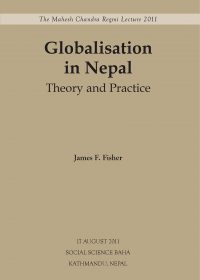Publications
Globalisation in Nepal: Theory and Practice
If a single word can summarise the experience of Nepal in the first decade of the 21st century, that word is surely ‘change’. But if ‘change’ can refer to altered states of almost anything, the meta-question of how change itself is changing is even more challenging. I discuss three separate instances of changing dynamics in Nepal, which at first seem utterly unconnected: the first is the Sherpas of Solu-Khumbu, the second is the Kaike-speaking Magars of Dolpa, and the third is the political figure, Tanka Prasad Acharya.
These three areas are unconnected in almost every way imaginable—geographically, culturally, linguistically, economically, religiously, and politically. I hope to show that, despite all these multiple differences, they share two analytical commonalities: one is that they are (or were, in Tanka Prasad’s case) undergoing the process of globalisation, in some ways an ancient process but one which now, and increasingly, confronts us all at every turn. I discuss an aspect of globalisation (the social and cultural sides of it, rather than the economic) not normally recognised as such, and discussed even less, but which, I hold, are central to understanding how change is changing in Nepal.
The second similarity results from using an analytical approach emphasising what in anthropological jargon is sometimes called ‘practice’, a term as obscure as globalisation is common, and which I will try to clarify, but which initially we can take as the idea that human behaviour is generated more by the things that we actually do than the beliefs that we hold. This leads to the epistemological position that only insofar as one does things is it possible to know about things. Therefore, I discuss, in the examples, what people do in everyday life (the exertion of agency by individuals, resulting in the creation of cultural novelty), especially to the extent that what they do is affected by globalisation. Since both these phenomena occur on a more or less unconscious level, the ancillary proposition follows that since we do not know what we are doing, what we do has more meaning than we know.
James Fisher taught for 38 years at Carleton College, Minnesota, where he was Professor of Anthropology and Asian Studies. His geographic interests lie in South Asia, and he has done fieldwork in Nepal on and off for almost 50 years on economics and ecology among Magars in Dolpa, education and tourism among Sherpas near Mount Everest, and he did a person-centred ethnography on Tanka Prasad Acharya, human rights activist. As a visiting Fulbright Professor, he spent two years helping start a new Department of Sociology and Anthropology at Tribhuvan University, Nepal.Prof Fisher’s books include Living Martyrs: Individuals and Revolution in Nepal (1997), Sherpas: Reflections on Change in Himalayan Nepal (1990), Trans-Himalayan Traders: Economy, Society, and Culture in Northwest Nepal (1986), Himalayan Anthropology: the Indo-Tibetan Interface (1978), and Introductory Nepali (1965).
the-mahesh-chandra-regmi-lecture-2011
